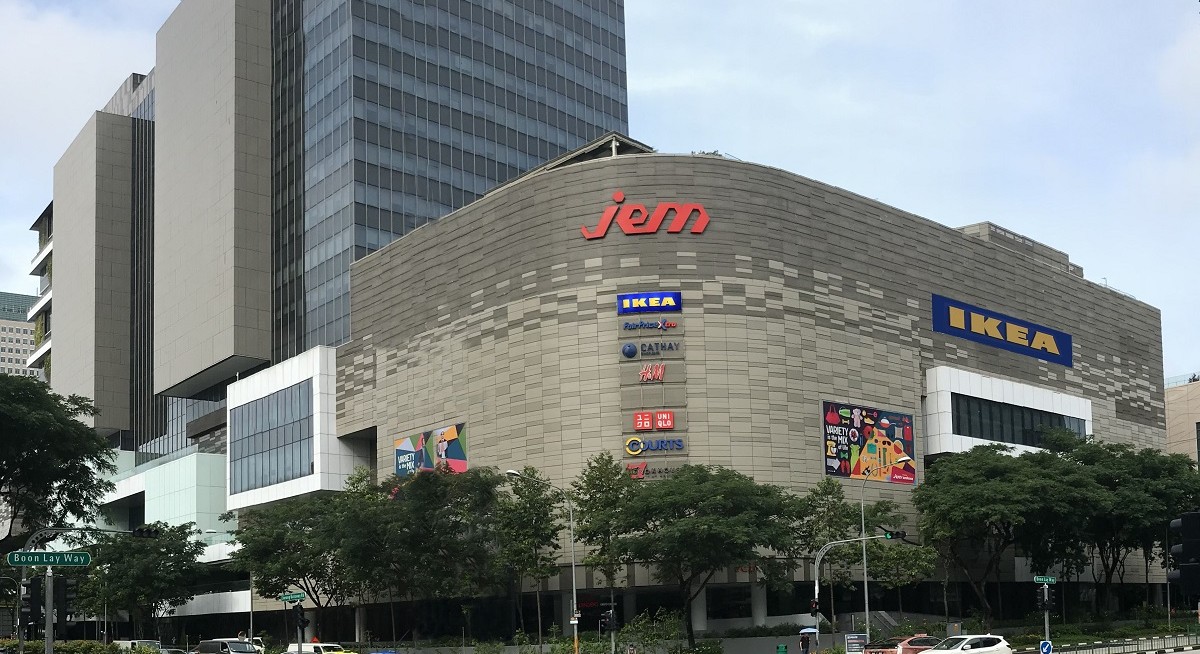See also: Capital Tower’s $25 mil upgrade to add mental wellness centre, keep Fitness First gym
 Built right above the Somerset MRT Station, 313@somerset is one of Singapore’s leading retail destinations
313@somerset continues to attract shoppers, given its location in the Orchard Road belt. The government is also planning to position the Somerset precinct — within the area from *Scape on Orchard Link to the junction of Somerset and Killiney Roads —as a youth hub.
In February this year, LREIT announced that about 660 sq ft of bonus gross floor area (GFA) from the Urban Redevelopment Authority (URA) Master Plan 2019 has been deployed to two prime units at the ground floor of 313@somerset, where one of them is currently tenanted by athleisure brand Puma.
Built right above the Somerset MRT Station, 313@somerset is one of Singapore’s leading retail destinations
313@somerset continues to attract shoppers, given its location in the Orchard Road belt. The government is also planning to position the Somerset precinct — within the area from *Scape on Orchard Link to the junction of Somerset and Killiney Roads —as a youth hub.
In February this year, LREIT announced that about 660 sq ft of bonus gross floor area (GFA) from the Urban Redevelopment Authority (URA) Master Plan 2019 has been deployed to two prime units at the ground floor of 313@somerset, where one of them is currently tenanted by athleisure brand Puma.
See also: CICT's 2HFY2025 DPU up 9.4% to 5.96 cents; full-year payout at 11.58 cents
For more stories about where money flows, click here for Capital Section
 Freehold office property Sky Complex, which comprises three office buildings, is located in Milan, Italy
LREIT’s Milan office property is doing well, receiving timely rental payments from its tenant. The property boasts an annual rental escalation based on 75% of ISTAT consumer price index variation.
“On portfolio performance, LREIT is well-positioned and anchored through its high occupancy of 99.8% with a long WALE of 8.7 years by NLA and 5.5 years by GRI,” says Chow. The REIT enters its FY2023 period and has laid out several growth plans. It may also look to expand its portfolio. Still, Chow emphasised that the REIT will have to stringently assess all potential acquisitions to ensure that it brings value to its unitholders. Some of its requirements to acquire a property include having a minimum occupancy of at least 80%, achieving an average rental rate comparable to the market rental rate for similar assets, not needing any material asset enhancement initiatives within two years of the acquisition, as well as the market condition at the time of the proposed offer.
Ahead in the ESG race
Besides financial growth and the addition of quality properties, LREIT also focuses on environmental, social, and corporate governance (ESG). Lendlease takes its responsibility to the planet seriously, notes Chow, adding that it has embarked on Mission Zero, a roadmap to reduce greenhouse gas (GHG) emissions and work with its partners, tenants and stakeholders.
LREIT has identified climate-related impacts as material risks to its business. It is committed to working alongside industry and government partners to develop plans to respond to physical, transitional, and financial risks associated with climate change. It has also set environmental goals, with ambitious science-based emissions reduction targets, including achieving zero carbon by 2040.
On Aug 29, LREIT became the first S-REIT to attain a net-zero carbon target — ahead of its original target of 2030 — through various carbon reduction strategies like energy efficiency initiatives and reducing energy consumption within its Singapore assets. As the first S-REIT to attain Net-Zero Carbon status, LREIT is also actively exploring new ways to reduce its energy consumption, adds Chow.
In FY2022, LREIT also achieved all of its ESG targets by maintaining its top leadership position in GRESB rankings; creating shared value and social license to operate; conducting asset-level climate-related risk assessments, and adopting recommendations by the Task Force on Climate-Related Financial Disclosures (TCFD); reducing the usage of water, energy and greenhouse gas emission; as well as increasing the recycling rate.
Its green efforts have not gone unnoticed. LREIT won first place in the Asia Retail (Overall) and Asia Retail (Listed) categories in the 2021 GRESB real estate assessment with the highest-tier rating of five stars for its ESG performance for two consecutive years since its listing in 2019.
Although becoming the first net-zero carbon S-REIT and winning several awards is a big feat, LREIT’s efforts do not stop there. LREIT is expected to meet its sustainability performance targets under its $960 million sustainability-linked loans and $216 million of sustainability-linked derivatives. It is also likely to generate net interest savings for LREIT’s unitholders.
“The goal is to further LREIT’s green ambitions, which it shares with its sponsor. LREIT has committed to ensuring that its entire portfolio achieves minimal to zero GHG emissions and uses water and other finite resources judiciously,” adds Chow.
Photos: Lendlease Global Commercial REIT
Freehold office property Sky Complex, which comprises three office buildings, is located in Milan, Italy
LREIT’s Milan office property is doing well, receiving timely rental payments from its tenant. The property boasts an annual rental escalation based on 75% of ISTAT consumer price index variation.
“On portfolio performance, LREIT is well-positioned and anchored through its high occupancy of 99.8% with a long WALE of 8.7 years by NLA and 5.5 years by GRI,” says Chow. The REIT enters its FY2023 period and has laid out several growth plans. It may also look to expand its portfolio. Still, Chow emphasised that the REIT will have to stringently assess all potential acquisitions to ensure that it brings value to its unitholders. Some of its requirements to acquire a property include having a minimum occupancy of at least 80%, achieving an average rental rate comparable to the market rental rate for similar assets, not needing any material asset enhancement initiatives within two years of the acquisition, as well as the market condition at the time of the proposed offer.
Ahead in the ESG race
Besides financial growth and the addition of quality properties, LREIT also focuses on environmental, social, and corporate governance (ESG). Lendlease takes its responsibility to the planet seriously, notes Chow, adding that it has embarked on Mission Zero, a roadmap to reduce greenhouse gas (GHG) emissions and work with its partners, tenants and stakeholders.
LREIT has identified climate-related impacts as material risks to its business. It is committed to working alongside industry and government partners to develop plans to respond to physical, transitional, and financial risks associated with climate change. It has also set environmental goals, with ambitious science-based emissions reduction targets, including achieving zero carbon by 2040.
On Aug 29, LREIT became the first S-REIT to attain a net-zero carbon target — ahead of its original target of 2030 — through various carbon reduction strategies like energy efficiency initiatives and reducing energy consumption within its Singapore assets. As the first S-REIT to attain Net-Zero Carbon status, LREIT is also actively exploring new ways to reduce its energy consumption, adds Chow.
In FY2022, LREIT also achieved all of its ESG targets by maintaining its top leadership position in GRESB rankings; creating shared value and social license to operate; conducting asset-level climate-related risk assessments, and adopting recommendations by the Task Force on Climate-Related Financial Disclosures (TCFD); reducing the usage of water, energy and greenhouse gas emission; as well as increasing the recycling rate.
Its green efforts have not gone unnoticed. LREIT won first place in the Asia Retail (Overall) and Asia Retail (Listed) categories in the 2021 GRESB real estate assessment with the highest-tier rating of five stars for its ESG performance for two consecutive years since its listing in 2019.
Although becoming the first net-zero carbon S-REIT and winning several awards is a big feat, LREIT’s efforts do not stop there. LREIT is expected to meet its sustainability performance targets under its $960 million sustainability-linked loans and $216 million of sustainability-linked derivatives. It is also likely to generate net interest savings for LREIT’s unitholders.
“The goal is to further LREIT’s green ambitions, which it shares with its sponsor. LREIT has committed to ensuring that its entire portfolio achieves minimal to zero GHG emissions and uses water and other finite resources judiciously,” adds Chow.
Photos: Lendlease Global Commercial REIT







